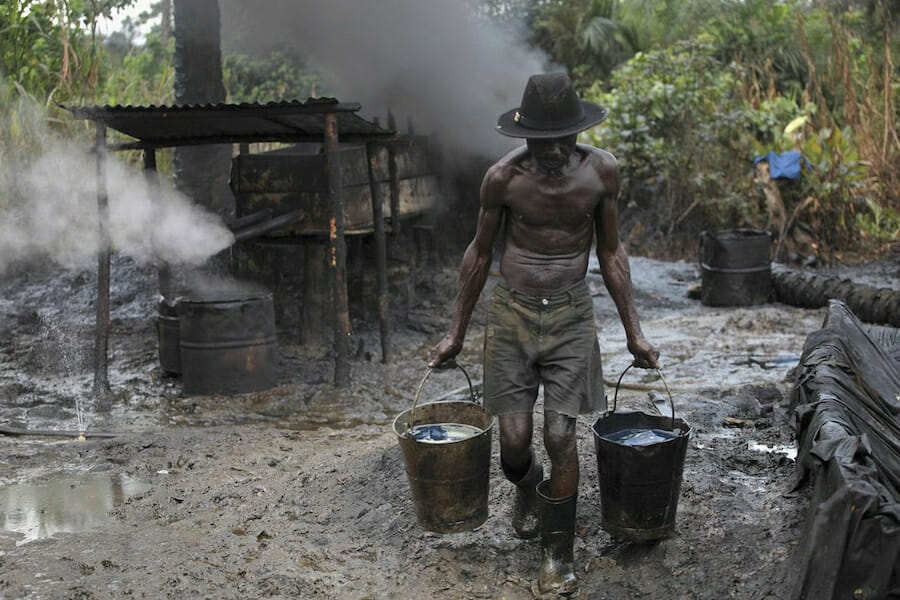End oil theft now
Recently, the Federal High Court sitting in Port Harcourt, Rivers State, found five persons guilty of oil theft and illegally dealing in petroleum products without appropriate licenses and sentenced them to various jail terms. This is one of the many cases of oil theft going on in the oil and gas industry which by all […]

Recently, the Federal High Court sitting in Port Harcourt, Rivers State, found five persons guilty of oil theft and illegally dealing in petroleum products without appropriate licenses and sentenced them to various jail terms. This is one of the many cases of oil theft going on in the oil and gas industry which by all accounts hampers not just the growth of the sector, but the country as a whole.
Tony Elumelu, Chairman of UBA Banking Group and Chief Executive of Heirs Oil and Gas, one of Nigeria’s indigenous oil companies, disclosed that the country lost about four billion dollars’ worth of crude oil to thieves in the first nine months of 2021.
- Train attack: We won’t rest until we rescue kidnapped victims – FG
- Defection: No provision to sack Gov Ayade, deputy – Court
He gave the example of his own company which produces about 87,000 barrels a day but loses 50,000 of it to oil thieves.
In his view, the activities of oil thieves, “is one of the highest levels of threat to our country because it’s so much money in the hands of people who don’t pay tax, and who are difficult to regulate and as such the country is not safe from them’’.
Similarly, the 2020 petroleum industry report released by the Nigeria Extractive Industries Transparency Initiative (NEITI) on March 7, 2022, said within a space of five years, 2016 to 2020, the country lost over 270 million barrels of crude oil to theft and sabotage. Also, the NEITI data indicated that 39.16 million barrels of crude oil valued at $44.73 million (N15.71 billion) were stolen.
This is a very serious issue, especially when viewed against the economic situation of the country. It is indeed disheartening that at a time when other oil producing countries are celebrating as a result of the increase in oil prices, Nigeria cannot do same due to the activities of these thieves among others. Worse still is the fact that the stealing has been growing exponentially and, going by the trend, it could continue to grow in the coming years.
Due to this development, Nigeria is hardly able to fulfil its quota of 1.735 million barrels per day allocated to it by the Organisation of Petroleum Exporting Countries (OPEC). Industry report shows that the country’s daily production has been around 1.417 million barrels per day since February.
The negative effects of oil theft are not just reflected in the massive revenue and production losses that the country incurs. If we consider the environmental factors of pollution and degradation of land caused by oil spillage as well as the insecurity arising from activities of rival gangs of oil thieves in their bid to upstage one another, we get a clearer picture of the havoc that oil theft has wreaked on the country.
Government at various levels have been trying to tackle the menace through a variety of measures. Because it is in the main an issue that borders on the country’s security, government’s efforts in this regard have been led predictably by the country’s security establishment. In the areas where oil theft is prevalent in the country, there are task forces made up of the various military, law enforcement and security agencies mandated to apprehend oil thieves and bring them before the law. This they do in conjunction with the various state governments and their agencies.
It has been observed, however, that despite these measures, the incident of oil theft has continued to rise.
Therefore, both the state and federal governments need to approach the issue with all seriousness. For a start, since most of the oil thieves and their activities are community based, the authorities must step up engagement with community stakeholders like traditional rulers, youth and women groups. The message should be clear and unambiguous enough that although oil theft may bring temporary benefits to the tiny few who engage in it, it is the communities that will ultimately suffer the consequences. These losses can be quantified in terms of disruption of the social lives, environmental pollution and insecurity.
Government can also identify and target the accounts of known oil thieves and block them. This should be done with the support of banks and financial institutions both locally and internationally. Blocking the financial proceeds of oil theft will be an effective disincentive to oil thieves as they will not be able to launder most of their money through the legitimate banking and financial systems.
There is also the need to subject the terms of operation and mandates of the task forces to periodic review as allegations of complicity with the oil thieves have been made against some of them.
As the economic situation in the country continues to deteriorate, driving Nigerians into severe poverty and hardship, we cannot afford to allow the activities of oil thieves to thrive in the critical sector of the economy, which is the major source of our revenue.
Oil theft is sabotage on the nation’s collective well-being and all necessary and legitimate measures must be taken by the authorities to stop it.
